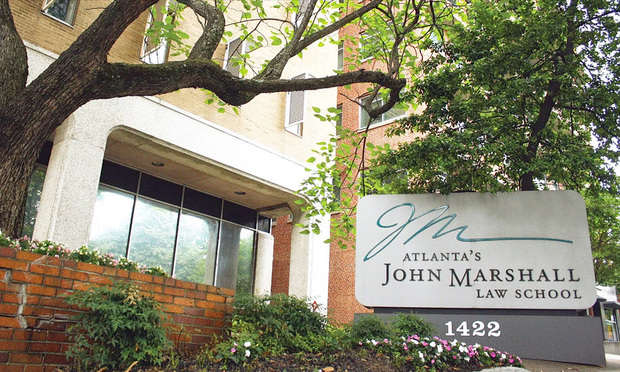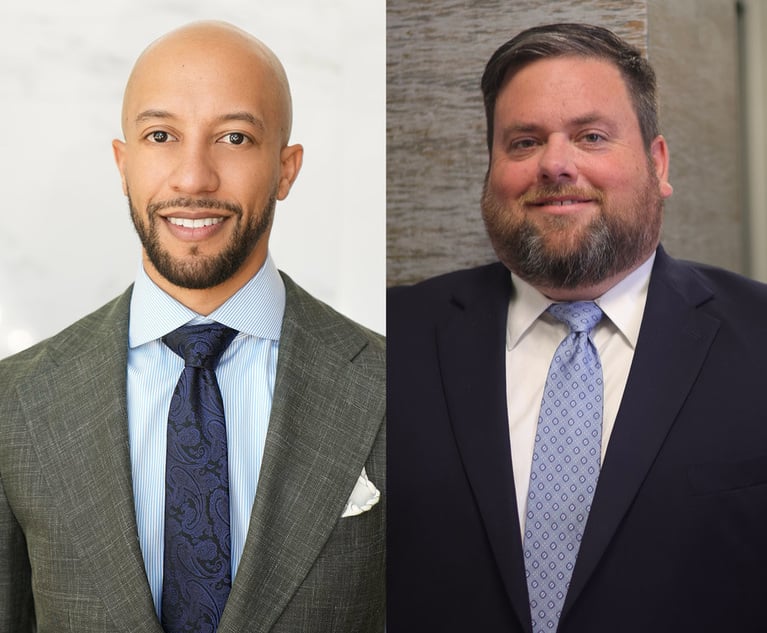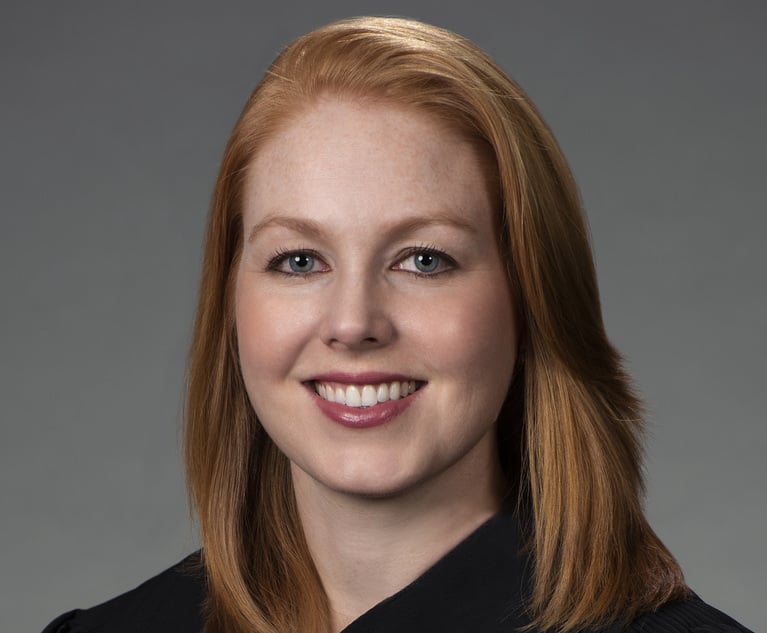After ABA Sanction, John Marshall Dean Says School Is Committed to Improve Bar-Pass Rate
Atlanta's John Marshall Law School is among 10 nationwide that the American Bar Association has publicly disciplined since August 2016 for violating its admissions rules by enrolling students it says are not likely to graduate and pass the bar. Per an Oct. 12 letter from the ABA's Council of the Section of Legal Education and Admissions to the Bar, the school must submit a report demonstrating compliance to the committee by Feb. 1 or appear before it at its meeting in late June.
November 28, 2017 at 02:50 PM
8 minute read
 John Marshall Law School, Atlanta
John Marshall Law School, Atlanta The dean of Atlanta's John Marshall Law School says the school has been exploring “a number of creative alternatives” to help comply with American Bar Association rules governing admissions standards.
The for-profit school is among 10 nationwide that the ABA's Council of the Section of Legal Education and Admissions to the Bar has publicly disciplined since August 2016 for enrolling students it says are not likely to graduate and pass the bar. The sanctions range from letters of noncompliance—one of which John Marshall received in October—to censure to probation.
John Marshall Dean Malcolm Morris said the sanctions are due to the school's first-time taker bar-pass rate, which Morris acknowledged needs to improve. The rate for the July 2017 exam was 51.7 percent, down from 64.3 percent on the July 2012 exam, according to the state Office of Bar Admissions.
“The challenge is how to achieve [pass-rate improvement] in a manner consistent with preserving our historic mission,” Morris said in an e-mail. “There is not an easy way to balance these two important objectives. … Atlanta's John Marshall Law School has a long-standing commitment to serving the legal needs of our community, and will take the necessary measures to ensure it continues to do so.”
The ABA accreditation committee concluded that John Marshall is “significantly out of compliance” with the accreditation requirements that schools “maintain sound admissions policies” and not “admit an applicant who does not appear capable of satisfactorily completing its program of legal education and being admitted to the bar.”
The ABA posted the letter of noncompliance on its website Oct. 12, after the committee considered the matter at its September meeting.
The council also concluded that John Marshall is out of compliance with the requirements that schools “maintain a rigorous program of legal education that prepares its students, upon graduation, for admission to the bar and for effective, ethical, and responsible participation as members of the legal profession” and “provide academic support designed to afford students a reasonable opportunity to complete the program of legal education, graduate and become members of the legal profession.”
John Marshall must submit a report to the committee by Feb. 1 and appear before it at its meeting in late June, unless the information in the written report demonstrates compliance with the standards. In that case, the committee may find the school to be in compliance and cancel the hearing. The school remains accredited by the ABA throughout this disciplinary process, according to Barry Currier, the ABA's managing director of accreditation and legal education. He e-mailed his comments to Law.com, which is owned by the Daily Report's parent company, ALM.
Actions like the ABA's recent crackdown on lax admissions standards are rare. Most recently, the committee voted to place Thomas Jefferson School of Law in San Diego on probation for its noncompliance with admission standards.
The ABA examined the schools' Law School Admission Test scores and undergraduate grades of admitted students, bar passage rates and academic support programs when reaching its conclusions.
Currier attributed the disciplinary actions in general to widespread changes in legal education over the past seven or so years, namely the national decline of applicants. If schools were already challenged in meeting the ABA's admissions standards in 2010, then they are even moreso today in light of the declining number and quality of applicants, he said.
“It is logical to ask these schools to demonstrate that the students who are coming into their programs have a reasonable likelihood of success with academics and on the licensing or bar exam, and that the schools have programs to maximize the students' likelihood of success,” Currier said in the e-mail to Law.com.
“Given our current processes, some of the matters that have recently come to a head actually began some time ago as a result of changing market forces.”
The median LSAT score of John Marshall's 2012 entering class was 150, while its median GPA was 2.99, according to ABA required disclosure forms. By 2016, the median LSAT score had slipped to 148, while the GPA crept up to 3.05.

The dean of
The for-profit school is among 10 nationwide that the ABA's Council of the Section of Legal Education and Admissions to the Bar has publicly disciplined since August 2016 for enrolling students it says are not likely to graduate and pass the bar. The sanctions range from letters of noncompliance—one of which John Marshall received in October—to censure to probation.
John Marshall Dean Malcolm Morris said the sanctions are due to the school's first-time taker bar-pass rate, which Morris acknowledged needs to improve. The rate for the July 2017 exam was 51.7 percent, down from 64.3 percent on the July 2012 exam, according to the state Office of Bar Admissions.
“The challenge is how to achieve [pass-rate improvement] in a manner consistent with preserving our historic mission,” Morris said in an e-mail. “There is not an easy way to balance these two important objectives. …
The ABA accreditation committee concluded that John Marshall is “significantly out of compliance” with the accreditation requirements that schools “maintain sound admissions policies” and not “admit an applicant who does not appear capable of satisfactorily completing its program of legal education and being admitted to the bar.”
The ABA posted the letter of noncompliance on its website Oct. 12, after the committee considered the matter at its September meeting.
The council also concluded that John Marshall is out of compliance with the requirements that schools “maintain a rigorous program of legal education that prepares its students, upon graduation, for admission to the bar and for effective, ethical, and responsible participation as members of the legal profession” and “provide academic support designed to afford students a reasonable opportunity to complete the program of legal education, graduate and become members of the legal profession.”
John Marshall must submit a report to the committee by Feb. 1 and appear before it at its meeting in late June, unless the information in the written report demonstrates compliance with the standards. In that case, the committee may find the school to be in compliance and cancel the hearing. The school remains accredited by the ABA throughout this disciplinary process, according to Barry Currier, the ABA's managing director of accreditation and legal education. He e-mailed his comments to Law.com, which is owned by the Daily Report's parent company, ALM.
Actions like the ABA's recent crackdown on lax admissions standards are rare. Most recently, the committee voted to place
The ABA examined the schools' Law School Admission Test scores and undergraduate grades of admitted students, bar passage rates and academic support programs when reaching its conclusions.
Currier attributed the disciplinary actions in general to widespread changes in legal education over the past seven or so years, namely the national decline of applicants. If schools were already challenged in meeting the ABA's admissions standards in 2010, then they are even moreso today in light of the declining number and quality of applicants, he said.
“It is logical to ask these schools to demonstrate that the students who are coming into their programs have a reasonable likelihood of success with academics and on the licensing or bar exam, and that the schools have programs to maximize the students' likelihood of success,” Currier said in the e-mail to Law.com.
“Given our current processes, some of the matters that have recently come to a head actually began some time ago as a result of changing market forces.”
The median LSAT score of John Marshall's 2012 entering class was 150, while its median GPA was 2.99, according to ABA required disclosure forms. By 2016, the median LSAT score had slipped to 148, while the GPA crept up to 3.05.
This content has been archived. It is available through our partners, LexisNexis® and Bloomberg Law.
To view this content, please continue to their sites.
Not a Lexis Subscriber?
Subscribe Now
Not a Bloomberg Law Subscriber?
Subscribe Now
NOT FOR REPRINT
© 2025 ALM Global, LLC, All Rights Reserved. Request academic re-use from www.copyright.com. All other uses, submit a request to [email protected]. For more information visit Asset & Logo Licensing.
You Might Like
View All
Veteran Litigators Move From Sidley Austin to Alston & Bird's New Chicago Office
3 minute read
'Pushed Into Oncoming Traffic': $5.85M Settlement in Mediated Auto Tort
6 minute read
Justice Known for Asking 'Tough Questions' Resolves to Improve Civility
4 minute read
'Nerve-Wracking': Fires Disrupting but Not Halting Work of Distributed Firms' LA Lawyers
3 minute readTrending Stories
- 1Why Wait? Arbitrate! The Value of Consenting to Arbitrate Your Sum Cases at NAM
- 2The Legal Status of Presidential Diaries Must Be Clarified
- 3Litigators of the Week: Shortly After Name Partner Kathleen Sullivan’s Retirement, Quinn Emanuel Scores Appellate Win for Vimeo
- 4Litigator of the Week Runners-Up and Shout-Outs
- 5Weil Hires White & Case Partner in Rebuild of London Finance Ranks
Who Got The Work
J. Brugh Lower of Gibbons has entered an appearance for industrial equipment supplier Devco Corporation in a pending trademark infringement lawsuit. The suit, accusing the defendant of selling knock-off Graco products, was filed Dec. 18 in New Jersey District Court by Rivkin Radler on behalf of Graco Inc. and Graco Minnesota. The case, assigned to U.S. District Judge Zahid N. Quraishi, is 3:24-cv-11294, Graco Inc. et al v. Devco Corporation.
Who Got The Work
Rebecca Maller-Stein and Kent A. Yalowitz of Arnold & Porter Kaye Scholer have entered their appearances for Hanaco Venture Capital and its executives, Lior Prosor and David Frankel, in a pending securities lawsuit. The action, filed on Dec. 24 in New York Southern District Court by Zell, Aron & Co. on behalf of Goldeneye Advisors, accuses the defendants of negligently and fraudulently managing the plaintiff's $1 million investment. The case, assigned to U.S. District Judge Vernon S. Broderick, is 1:24-cv-09918, Goldeneye Advisors, LLC v. Hanaco Venture Capital, Ltd. et al.
Who Got The Work
Attorneys from A&O Shearman has stepped in as defense counsel for Toronto-Dominion Bank and other defendants in a pending securities class action. The suit, filed Dec. 11 in New York Southern District Court by Bleichmar Fonti & Auld, accuses the defendants of concealing the bank's 'pervasive' deficiencies in regards to its compliance with the Bank Secrecy Act and the quality of its anti-money laundering controls. The case, assigned to U.S. District Judge Arun Subramanian, is 1:24-cv-09445, Gonzalez v. The Toronto-Dominion Bank et al.
Who Got The Work
Crown Castle International, a Pennsylvania company providing shared communications infrastructure, has turned to Luke D. Wolf of Gordon Rees Scully Mansukhani to fend off a pending breach-of-contract lawsuit. The court action, filed Nov. 25 in Michigan Eastern District Court by Hooper Hathaway PC on behalf of The Town Residences LLC, accuses Crown Castle of failing to transfer approximately $30,000 in utility payments from T-Mobile in breach of a roof-top lease and assignment agreement. The case, assigned to U.S. District Judge Susan K. Declercq, is 2:24-cv-13131, The Town Residences LLC v. T-Mobile US, Inc. et al.
Who Got The Work
Wilfred P. Coronato and Daniel M. Schwartz of McCarter & English have stepped in as defense counsel to Electrolux Home Products Inc. in a pending product liability lawsuit. The court action, filed Nov. 26 in New York Eastern District Court by Poulos Lopiccolo PC and Nagel Rice LLP on behalf of David Stern, alleges that the defendant's refrigerators’ drawers and shelving repeatedly break and fall apart within months after purchase. The case, assigned to U.S. District Judge Joan M. Azrack, is 2:24-cv-08204, Stern v. Electrolux Home Products, Inc.
Featured Firms
Law Offices of Gary Martin Hays & Associates, P.C.
(470) 294-1674
Law Offices of Mark E. Salomone
(857) 444-6468
Smith & Hassler
(713) 739-1250






